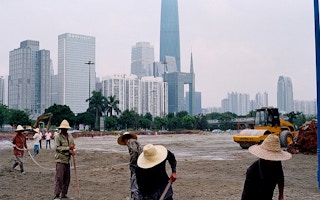Cities must do more to slow the migration of people from the countryside to urban slums, by using their power and money to invest in farmers and promote their products, experts said on the sidelines of a U.N. global food security meeting.
Many cities rely on imports to feed their people, but a few have begun investing in their local farmers as well.
Ouagadougou authorities are helping local producers promote their fruit juices, cooking oils, dried fruits and other products in the streets of Burkina Faso’s capital, to help them compete with smartly packaged imported goods.
Several Brazilian cities have decided to improve the lot of nearby small farmers by setting up contracts for them to supply urban school canteens.
“There are many mayors and city authorities thinking maybe they must begin to invest in rural development … They don’t want to have a lot of migration,” said Nicolas Bricas, researcher of the French Agricultural Research Centre for International Development (CIRAD).
“
You cannot avoid migration if you don’t invest in rural development, because people will go.
Nicolas Bricas, researcher, French Agricultural Research Centre for International Development (CIRAD)
Relying on imported foods is risky, Bricas said.
“It was a convenient strategy for the last two to three decades when markets were stable and had low prices. But since the 2008 price crisis, we know that’s no certainty,” he said.
Cities can change the balance of power in the way food reaches the market, said Corinna Hawkes, professor of food policy at London’s City University.
“They are … a new power player that can go in and start to try and say we only want food from people who have got decent livelihoods,” she told the Thomson Reuters Foundation.
To keep the costs down, city authorities will need to look at the many groups involved in getting food from the field to people’s tables and see if there are ways of cutting out some of the middlemen, Hawkes said.
Home village
Cities can make a difference to the lives both of the urban and rural poor, Hawkes said on the sidelines of the Committee on World Food Security, a U.N. body which brings together governments and food experts to discuss global food security.
In Senegal, lack of investment in agriculture - unusual in West Africa - has resulted in many people migrating to the cities, and to other countries, and has left Dakar vulnerable to fluctuating international food prices, Bricas said.
“They begin to think that maybe they must invest in agricultural development, but it is late,” he said.
Recently a group of people living in Dakar decided to invest in their home village to try and stop people - especially the young - from migrating to the cities.
“They want to promote the idea that you can live well in rural areas … and (promote) a new kind of agriculture which is easier, has a modern image, and is smart,” he said.
He has found similar groups in other major West African cities like Conakry, Abidjan and Bamako.
The average age of farmers today is 53 years globally, and this is expected to rise to 58 years in the next decade. In the United States it is already 60, according to the World Bank.
In northern Cameroon, farmers living in what is traditionally a cotton growing region have begun supplying towns and cities with yams instead, making enough money to build schools and medical centres, Bricas said.
This is partly possible because they have good access to urban markets, he added.
Countries like Vietnam, China and Cuba have deliberately invested in rural areas - building good roads, services, clean water, electricity and internet access - to help prevent migration to cities.
“You cannot avoid migration if you don’t invest in rural development, because people will go. If they can’t go to the city of their country they will leave country and find a city elsewhere,” he said.
This story was published with permission from Thomson Reuters Foundation, the charitable arm of Thomson Reuters, that covers humanitarian news, women’s rights, trafficking, corruption and climate change. Visit http://news.trust.org.










